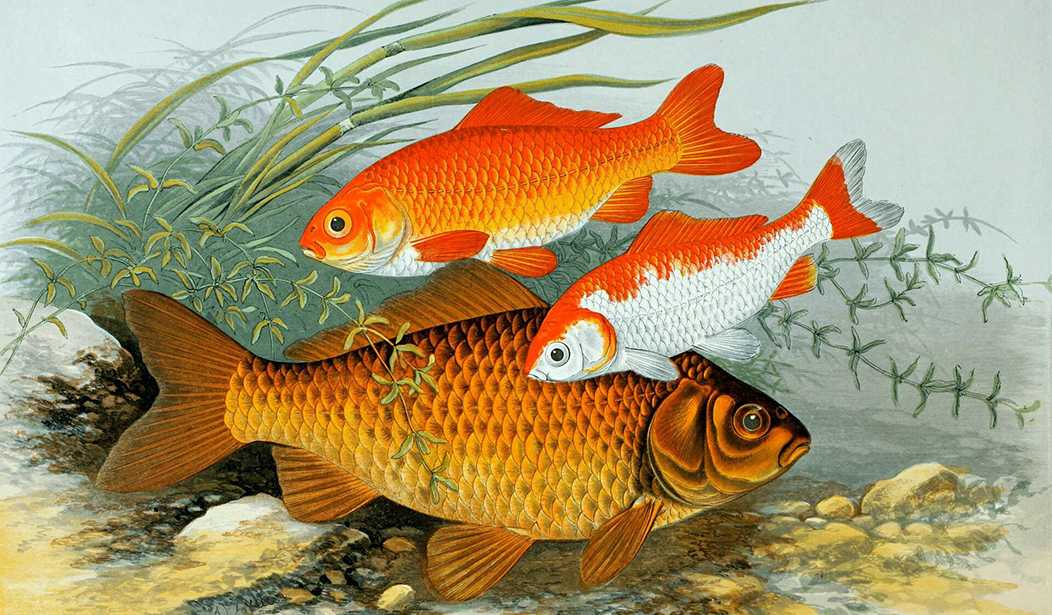When I was a young man growing up in Allamakee County, Iowa, the property where I spent most of that youth included a couple of miles of lovely cold-water trout stream. Bear Creek started with a series of springs north and west of the hamlet of Highlandville and flowed into the Upper Iowa River a few miles downstream, near the state highway. And a recurring problem we had with that lovely waterway was carp, pushing up from the river.
My father was always after me, on those occasions when he caught me sitting around doing nothing, to go to the lower reaches of the creek, catch a mess of carp, and throw them into the cornfield, where they fed raccoons and fertilized the fields. Big, tough carp are fun to catch on rod and reel, although an electric fence generator with a lead in the water is more efficient. (Dynamite was even more efficient, but that's a story for another day.)
Now, we see that a variation of the common Eurasian carp, the domestic goldfish, is causing problems in the Great Lakes.
Inside a fishbowl, the goldfish — a species of carp native to East Asia, bred for aesthetic delight and traditionally believed to bring good fortune — is hardly more than home décor. Usually just a few inches long, it is among the easiest of pets to keep.
But released into the wild, the seemingly humble goldfish, freed from glass boundaries and no longer limited to meager meals of flakes, can grow to monstrous proportions. They can even kill off native marine wildlife and help destroy fragile and economically valuable ecosystems.
“They can eat anything and everything,” said Christine Boston, an aquatic research biologist with Fisheries and Oceans Canada.
While Christine Boston is talking about goldfish in particular, former pets released into an ecosystem, these fish remain simply carp, which have been causing problems in North American waterways since 1831.
Invasive species can be a real problem. Humans are generally named the culprits, and our domestic animals running loose have indeed caused plenty of problems in new environments that were not adapted to them: feral swine in the United States and Canada, for example, hippos in Colombia, carp in North American waters, and rats almost everywhere. Although humans were not responsible for what may well be the largest such incursion. Roughly 2.7 million years ago, when South America connected to North America, there occurred the Great American Interchange, which saw such things as new predators appearing among prey species not prepared for them. For instance, saber-toothed cats went south, and the aptly-named terror birds went north. That event caused a wave of extinctions unmatched in the Americas since the dinosaurs got theirs and until the advent of humans. That's nature. It's frequently harsh and unkind but, left to itself, usually ends up striking a new balance.
In the case of these Great Lakes goldfish, it seems human releases, accidental and deliberate, are the primary cause.
Nicholas Mandrak, a professor of biological sciences at the University of Toronto Scarborough, said that while goldfish were introduced to North America in the late 1800s, the wild population had begun to “dramatically increase” in the past two decades. Their spawning explosion, he said, resulted partly from people in densely populated areas releasing pets in urban ponds.
This is believable. While biologists understand the impacts invasive species can have, most folks don't know or care. In fact, plenty of people don't seem to even care much about their pets, given the number of cats and dogs we see dumped out of cars and abandoned around our Susitna Valley homestead. Most of the people who are the most vocal about animals seem to be the ones who know the least about them.
As with the run-of-the-mill Eurasian carp, the goldfish genie would appear to be out of the Great Lakes bottle, and there's probably little that can be done about them.















Join the conversation as a VIP Member